Offline circulation utilitiesï
Koha allows for you to continue circulation actions while offline by using any one of three utilities.
Offline circulation in Kohaï
Attention
The offline circulation module was deprecated in Koha version 23.11. Only the Firefox plugin and Windows tool are now supported.
If the AllowOfflineCirculation preference is set to âEnableâ the library staff can continue to perform circulation actions within Koha when the system is offline. You will want to visit http://your-koha-staff-client-url/cgi-bin/koha/circ/offline.pl at least once while online and bookmark that page. That is the page you will go to when you are offline.
Important
The offline interface uses HTML LocalStorage, which depending on the browser and user setting, is limited to 2.5MB or 5MB per domain. This means that larger systems will not be able to synchronize their data and are recommended to use either the Firefox or Windows application for offline circulation.
Setupï
Before the first time the system goes offline go to Circulation and choose âBuilt-in offline circulation interfaceâ
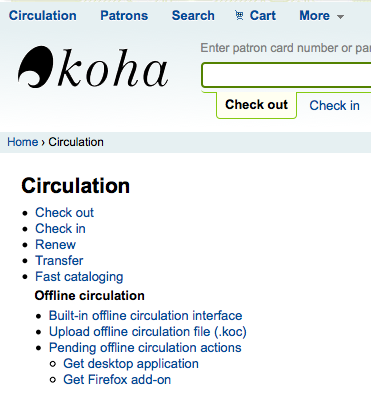
And synchronize your data on every circulation computer by clicking the âSynchronizeâ link on the right of the screen.

Important
The offline interface uses HTML LocalStorage, which depending on the browser and user setting, is limited to 2.5MB or 5MB per domain. This means that larger systems will not be able to synchronize their data and are recommended to use either the Firefox or Windows application for offline circulation.
This will allow you download a local copy of your patrons and circulation data. Click the âDownload recordsâ link at the top of the page to synchronize your data.

Once your data is downloaded you will see the dates your data was last synced to the right of each data set.
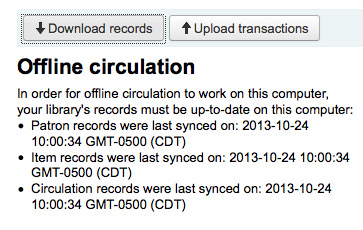
This should be done regularly in preparation for any unexpected connection losses.
Circulatingï
When your system goes offline visit the Offline Circulation page (http://your-koha-staff-client-url/cgi-bin/koha/circ/offline.pl) in Koha and click âCheck outâ or âCheck inâ to perform offline actions.
Checking out is done by searching for the patron by barcode or name at the top of the âCheck outâ screen. After selecting a patron you will be presented with the synced patron info, including fines and check outs.
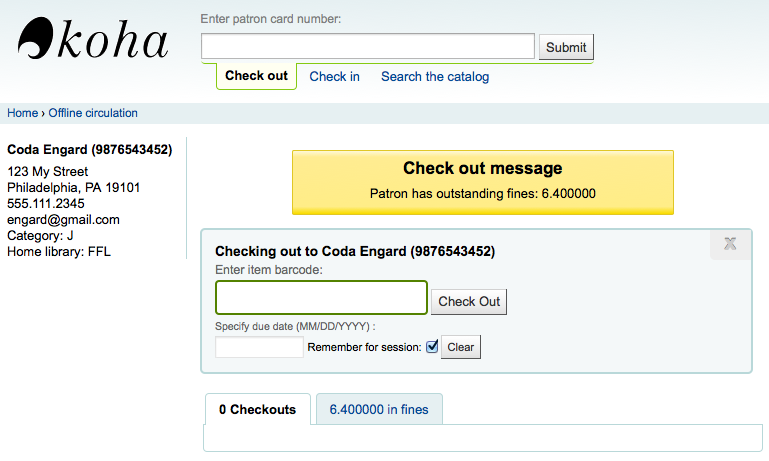
Scan the barcode of the item you would like to check out and enter a due date. If you donât enter a due date Koha will prompt you for one.
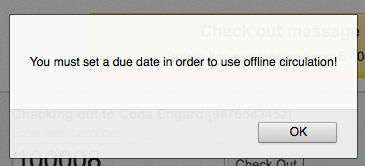
Once the item is checked out it will appear below the patronâs info.
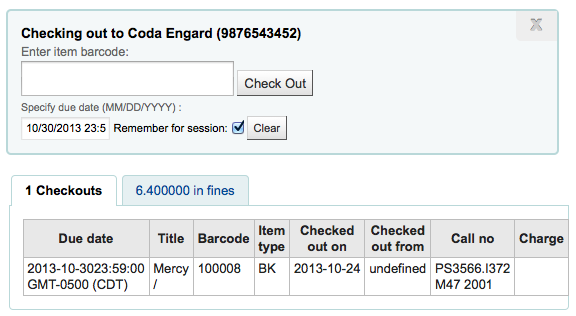
Koha offline uploadingï
Once the system is back online visit the âSynchronizeâ page on the Offline circulation module and click âUpload transactionsâ
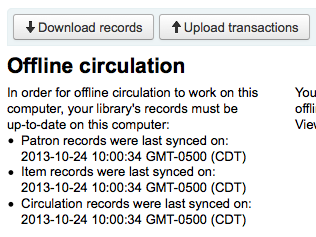
After the files are uploaded you can click âView pending offline circulation actionsâ on the right.
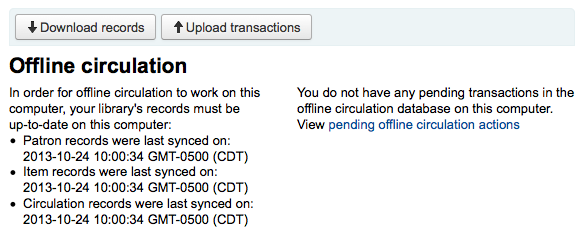
After clicking âView pending offline circulation actionsâ you will be brought to a summary of all of the actions you loaded in to Koha in your *.koc file.
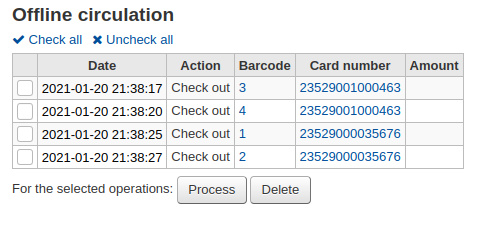
Once all of the logs from all of the circulation computers are loaded you will be able to check them all or select just those you want to process into Koha.
Click on the âProcessâ button and Koha will record every stored transaction one by one. For each transaction, the status will change to:
âSuccess.â if the transaction was processed correctly
âBorrower not found.â if the borrower card number is incorrect
âItem not found.â if the item barcode is wrong
âItem not issued.â if you checked in an available item
Once finished you will have a summary of all of your transactions
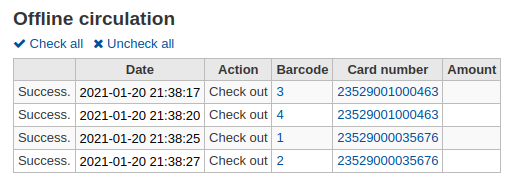
Firefox pluginï
There is an offline circulation tool that you can add to your Firefox browser as an add-on. To do so, just go to https://addons.mozilla.org/en/firefox/addon/koct/ page and click on the âinstall nowâ button. You may have to confirm the installation, just click on âinstall nowâ and then restart Firefox to complete the installation.
Once you have installed the plugin and restarted Firefox, you will see the Koha logo in the download bar at the bottom right of Firefox.

A click on the logo will open the tool in its own window.
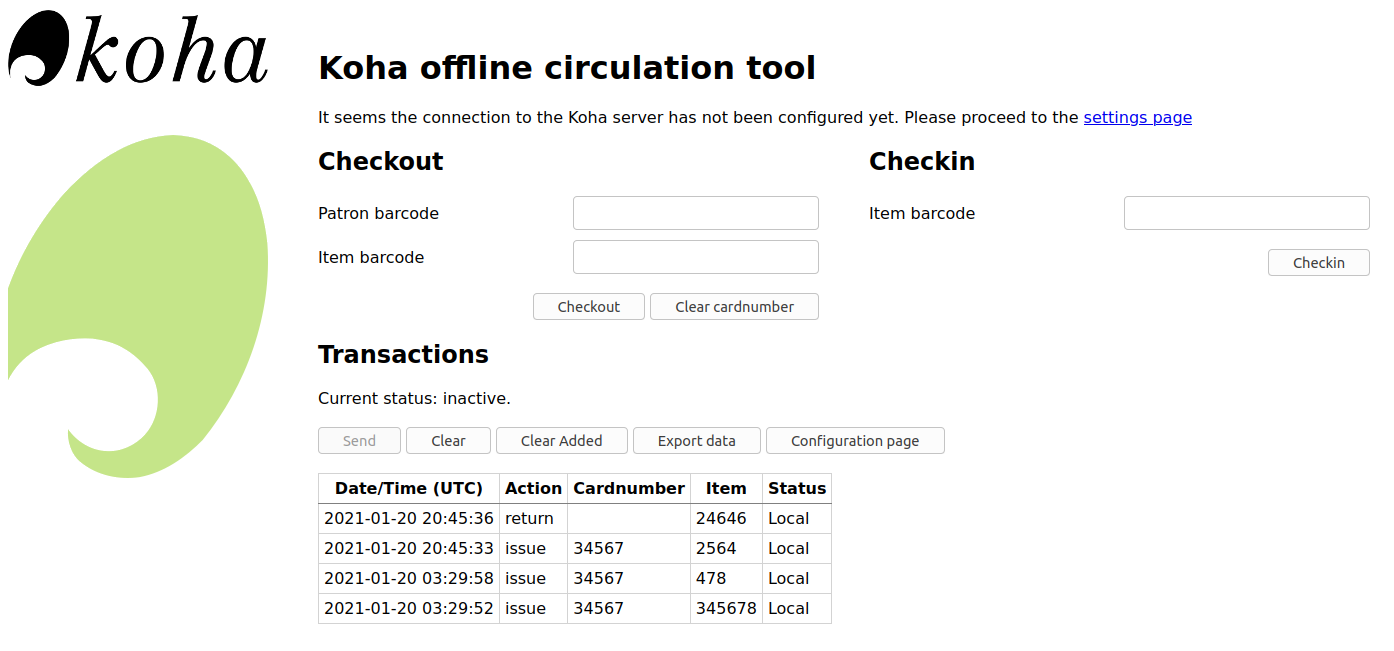
The plugin consists of three sections:
The âCheck outâ section is where you check out items
The âCheck inâ section is where you check in items
The âTransactionsâ section is where you can track the transactions done while in offline mode
The transactions will keep information until you empty it.

If youâd like to clear the transactions, click the âClearâ box before hitting the âOKâ button.
The first thing you want to do then is to set up the plugin. Proceed to the settings page, linked in the top right of the page or under âConfiguration pageâ in the Transactions section.
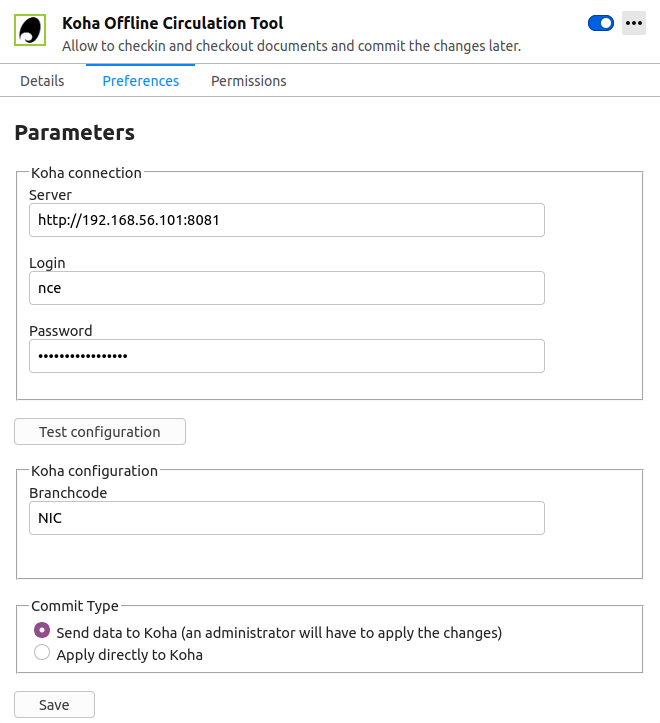
Answer the 5 questions presented:
Server = the URL of the librarian interface
Username = your staff account login
Password = your staff account password
Branch code = the code for the branch where you are located
Commit Type = If you select âSend data to Kohaâ, your account will need to be approved by an administrator. If you select âApply directly to Kohaâ, your account will not need to be approved.
Important
To save the settings, you will have to close the plugin window and re-open it by clicking again on the Koha logo in the add-on bar.
Note
You can create a staff account dedicated to the offline circulation. So that, no matter who is at the circulation desk, they can all use the same login. Along those lines, you can use a group login that you already have in place for circulation as well.
Once you have everything set up you can start checking items in and out.
Checking out:
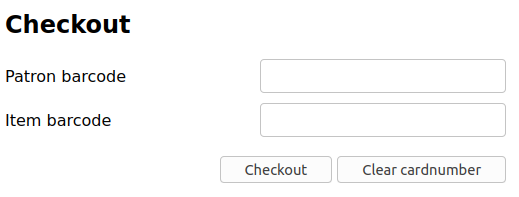
Under the âCheckoutâ heading
Scan the patron barcode
Scan the item barcode
Click âCheckoutâ
Checking in:

Under the âCheckinâ heading
Scan the item barcode
Click âCheckinâ
Each time, you check out or check in an item, a new transaction is recorded in the local plugin database. This is recorded in the Transactions section bellow.
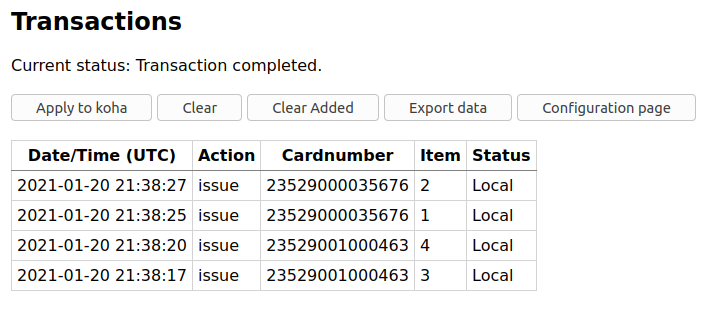
Note
The status will be âLocal.â as long as you are offline and donât process the transactions into Koha.
When your Internet connection comes back up you will want to get these transactions in to Koha. Before processing these transactions you should be aware of a few issues.
Because you are not connected to your Koha database when using this plugin holds will need additional processing. If an item you check in while offline has a hold, the hold is kept on the item. Since, you canât confirm holds found during the processing of every check in, the holds stay on the item and will need to be managed later. If you only checked in a few items you can just keep a record of them all. If you checked in a lot of items you can use the Holds queue once it rebuilds to see what holds made it to the shelf erroneously.
Similarly, if an patron card was expired, the offline circulation tool wonât know about it, so the checkout will be recorded regardless of the patronâs account being blocked normally.
You have two options for adding this data to Koha

Apply to Koha
If you checked in/out on more than one computer at the same time, what you want is to process every transaction consistently. Letâs say for instance that one patron checked a book out on one computer and then checked the same book in on another computer. To be consistent, you need to record the check out first and then the check in. Not the opposite! To do so, you need to group every transaction in one place, sort them all and then, process everything. So, you need to use the âApply to Kohaâ option from every plugin/computer you worked with. This way, the log will go to Koha and be accessible from the Offline Circulation page.
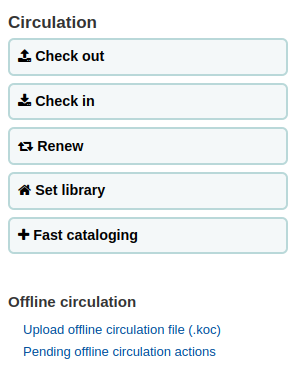
Get there: Circulation > Pending offline circulation actions

Once all of the logs from all of the circulation computers are loaded you will be able to check them all or select just those you want to process into Koha.
Click on the Process button and Koha will record every stored transaction one by one. For each transaction, the status will change to:
âSuccess.â if the transaction was processed correctly
âBorrower not found.â if the borrower card number is incorrect
âItem not found.â if the item barcode is wrong
âItem not issued.â if you checked in an available item
Once finished you will have a summary of all of your transactions

Apply directly
If you performed all of the circulation actions on one computer then everything is sorted already so you can choose to âApply directlyâ
The status column will be updated to let you know if the transactions were applied
âSuccess.â if the transaction was processed correctly
âBorrower not found.â if the borrower card number is incorrect
âItem not found.â if the item barcode is wrong
âItem not issued.â if you checked in an available item
Offline circulation tool for Windowsï
The Offline circulation utility can be downloaded at: https://github.com/bywatersolutions/koha-offline-circulation/releases
To generate a borrowers.db file for loading in to the Windows tool you will need to run the file generator via a cron job.
Upload offline circulation fileï
The offline circulation tool for Windows will generate a KOC file that you can upload into Koha once your system comes back up.
On the Circulation menu click âUpload offline circulation file (.koc)â

Browse your computer for the *.koc file

Once the file is uploaded, click the process the file
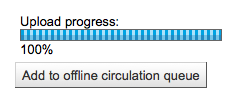
When this is complete youâll be able to upload another file or tend to pending offline circulation actions.
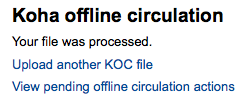
After clicking âView pending offline circulation actionsâ you will be brought to a summary of all of the actions you loaded in to Koha in your *.koc file.

Once all of the logs from all of the circulation computers are loaded you will be able to check them all or select just those you want to process into Koha.
Click on the Process button and Koha will record every stored transaction one by one. For each transaction, the status will change to:
âSuccess.â if the transaction was processed correctly
âBorrower not found.â if the borrower card number is incorrect
âItem not found.â if the item barcode is wrong
âItem not issued.â if you checked in an available item
Once finished you will have a summary of all of your transactions

Built with Sphinx using a theme provided by Read the Docs.
